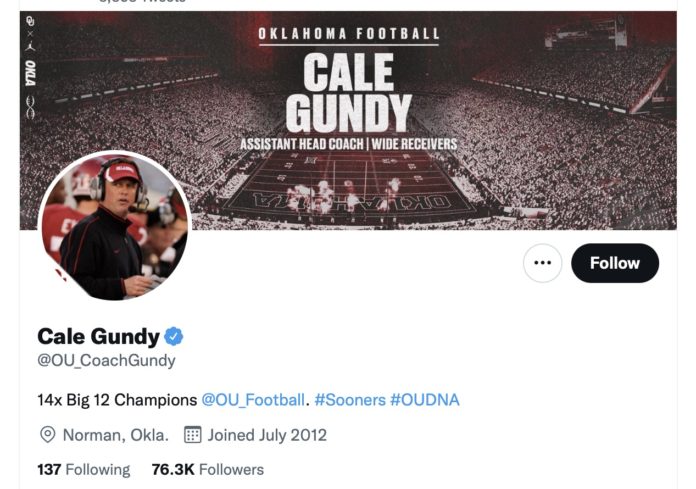Long-time University of Oklahoma assistant football coach Cale Gundy resigned over the weekend after reading aloud [a racial slur?] from a player’s iPad during a film session. A member of the Sooner staff since 1999, Gundy said he resigned so that he would not present the “program I love the disservice of distracting” from its mission.
In a Sunday tweet, he explained the situation thusly:
“Last week, during a film session, I instructed my players to take notes. I noticed a player was distracted and picked up his iPad and read aloud the words that were written on his screen. The words displayed had nothing to do with football. One particular word that I should never – under any circumstance – have uttered was displayed on that screen. In the moment, I did not even realize what I was reading and, as soon as I did, I was horrified.
“I want to be very clear: the words I read aloud from that screen were not my words. What I said was not malicious; it wasn’t even intentional. Still I am mature enough to know that the word I said was shameful and hurtful, no matter my intentions. The unfortunate reality is that someone in my position can cause harm without ever meaning to do so. In that circumstance, a man of character accepts accountability. I take responsibility for my mistake. I apologize.”
But it is also clear that, offensive word notwithstanding, the intention of an angry coach was to publicly humiliate a player in front of his peers. [That it backfired might seem to be instant karma to some disinterested observers – or maybe OSU fans.]
Gundy was so dedicated to embarrassing the offender that his mouth was moving faster than his mind. How else did he read what he read, say what he said without realizing it?
I had originally thought that Gundy was so dedicated to embarrassing the offender that his mouth was moving faster than his mind. How else did he read what he read, say what he said without realizing it?
But Monday head coach Brent Venables provided additional information on the incident. Via the Associated Press:
“A day after Oklahoma assistant head football coach Cale Gundy announced his resignation, the school said Monday that Gundy uttered a racially charged word multiple times during a film session last week.
“‘Coach Gundy resigned from the program because he knows what he did was wrong,’ first-year Sooners coach Brent Venables said in the statement. ‘He chose to read aloud to his players, not once but multiple times, a racially charged word that is objectionable to everyone, and does not reflect the attitude and values of our university or our football program. This is not acceptable. Period.”
Messing up while speed-reading – Gundy’s claim – is not the same as choosing to recite, “not once but multiple times, a racially charged word that is objectionable to everyone.”
That he was reading from a player’s iPad does not excuse his word usage. We can get away with saying or texting things to our friends that might prove offensive from someone else.
Since Americans and American journalists, in particular, have a Victorian sense of prudery in some of the strangest places, we can only surmise what the “shameful and hurtful” word was. In the context of what is acceptable for what one friend can say to another, but someone else cannot, we might guess it to be the “N-word.” But other terms of positional endearment come to mind – none of which is in my journalistic vocabulary.
One of earliest examples of this dichotomy is found in the prototype western, The Virginian.
Early on, having just arrived in Medicine Bow, the unnamed narrator reports on a meeting between saddle pals Steve and the Virginian. The blank is due to the fact that it was written in Victorian times.
“I suppose you have me beat,” said Steve, grinning at him affectionately. “You’re such a son-of-a- —– when you get down to work. Well, so long! I got to fix my horse’s hoofs.”
“I had expected that the man would be struck down. He had used to the Virginian a term of heaviest insult, I thought. I had marveled to hear it come so unheralded from Steve’s friendly lips. And now I marveled still more. Evidently he had meant no harm by it, and evidently no offence had been taken. Used thus, this language was plainly complimentary. I had stepped into a world new to me indeed.
So, what might seem offensive, might not be. And then again, later that night at the card table:
It was now the Virginian’s turn to bet, or leave the game, and he did not speak at once.
Therefore Trampas spoke. “Your bet, you son-of-a- —–.”
The Virginian’s pistol came out, and his hand lay on the table, holding it unaimed. And with a voice as gentle as ever, the voice that sounded almost like a caress, but drawling a very little more than usual, so that there was almost a space between each word, he issued his orders to the man Trampas …
“When you call me that smile.”
It’s not just what you say, but how and when – and who is saying it.
This column was updated at 5:15 p.m. to reflect new information made public on Monday, Aug. 8.








